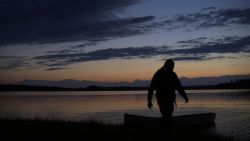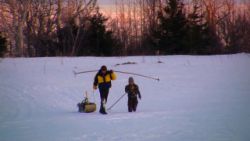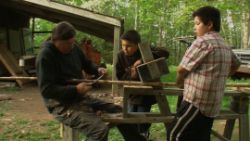Halifax Media Co-op
News from Nova Scotia's Grassroots
Seeking Netukulimk, by Martha Stiegman
Seeking Netukulimk (22 min)
by Martha Stiegman and Kerry Prosper
Friday September 13th at 4:30.
Park Lane Cinema. Atlantic Film Festival.
This blog was originally posted at Small Scales, the excellent East Coast fisheries blog administered by the Marine Issues Committee of the Ecology Action Centre.
Seeking ‘Netukulimk’ looks a little different for everyone. My search involved hanging my seven-months-pregnant belly over the bow of a canoe at midnight. My guide and co-director Kerry Prosper was paddling us along the shores of Pomquet harbor. He was fishing for eels. I was fishing for interesting camera angles. Together we were working on a Seeking Netukulimk, a documentary project that would see me and my video camera follow Kerry across frozen coastal estuaries in -30 wind-chills as he taught his grandkids to cut holes in thick ice and spear eels from the muddy bottom, and to hot summer powwows where they shared their catch at community feasts.
The film will be screening this Friday, September 13th , at 4:30 pm in Park Lane Cinema, as part of the Atlantic Film Festival. Tickets can be purchased at the door, or via the Atlantic Film Festival website. The directors – myself and Kerry Prosper, along with co-producer Dr. L. Jane McMillan, the Canada Research Chair in Indigenous Peoples and Sustainable Communities, will be in attendance.
Friday also marks Donald Marshall Jr.’s birthday. For JR, as he was known by those close to him, ‘Seeking Netukulimk’ meant eel fishing as a way to reconnect with his Mi’kmaq identity and community after spending 11 years in jail for a murder he did not commit. Fishing was a way to put food on the table and to make a modest living. But fishing would also force JR back into the spotlight – arrested on charges fought all the way to the Supreme Court to win recognition of Mi’kmaq, Maliseet and Passamaquoddy Treaty rights.
Kerry Prosper was Chief of Paqtnkek Mi’kmaw Nation at the time, and had given JR permission to fish in the district, as per Mi’kmaq customary law. Dr. L. Jane McMillan, our co-producer in “Seeking Netukulimk”, was fishing with JR the morning he was charged. Jane brought me to that spot on the shore of Pomquet harbour to share her recollections: “The DFO (Fisheries and Oceans Canada) officer rode up, he had his uniform on, and he said to JR: “You got a license?” and JR said “No – I got a treaty!”
The 1999 Marshall Decision has been a watershed case here on the East Coast, a tremendous victory for the Mi’kmaq people. In R. v. Marshall, [1999] 3 SCR 456, the courts recognized the validity of the covenant chain of historic Peace and Friendship Treaties negotiated in the 18th century, a move that opened the way for the current tripartite negotiations with the Provincial and Federal governments about the implementation of these historic treaty rights in a modern-day context. The courts also ruled that existing fisheries regulations were unconstitutional in that they failed to accommodate these treaty rights.
But despite this momentous win in the courts, the federal government continues to impose existing fisheries regulations, assimilating Mi’kmaq commercial fishers into an ecologically unsustainable industry. And it refuses to acknowledge the legitimacy of a potential livelihood fishery under Mi’kmaq jurisdiction.
So as political inter-governmental negotiations continue, people like Kerry are working at the grassroots to re-invigorate traditional concepts like Netukulimk, in the hopes it becomes a guiding principle in the development ofMi’kmaq resource management institutions.
What is Netukulimk you might ask? I could use the words others have shared with me to try and explain it to you: it’s a sacred responsibility, that comes from a relationship with all the animate and inanimate elements of our ecosystem, with ancestors and future generations, that is hard to grasp for those of us in the non-native world. It’s the way of life anchored in the land that the Mi’kmaq people were trying to protect when they negotiated treaties with the British Crown.
But you really have to spend time on the land with traditional people like Kerry, to begin understanding its meaning. Hopefully watching our film will provide a glimpse, for those of us who don’t get that chance.
You have to watch Kerry teach his grandkids to harvest trees in winter snow, carve long poles once the wood has dried in summer, and attach intricate spears; canoe through shallow coastal waters under dim moonlight to spear eels from the muddy bottom. You have to feel how important this precious knowledge is, how integral a part of Mi’kmaq culture it is. You also have to realize how threatened it is – by colonial laws and settlement patterns that continue to restrict access to resources, and by commercial overexploitation that is decimating what’s left of the bounty of these lands and waters of Mi’kmaq’ki.
It takes time to understand the concept of Netukulimk. I’ve been lucky enough to get an introduction, by working with Kerry Prosper on this film. I’ve learned that those of us in the non-native community have a thing or two to learn from our Mi’kmaq brothers and sisters about what it means to live here, and about the traditional laws that have long been anchored in these lands and waters. We have a responsibility to act as allies, to learn about the spirit and intent of the original Peace and Friendship Treaties, and the way of life anchored in Netukulimk they were meant to protect. And we have to find ways to become responsible treaty partners, because our governments certainly aren’t.
Maybe learning about Netukulimk can be a step along that journey.
The site for the Halifax local of The Media Co-op has been archived and will no longer be updated. Please visit the main Media Co-op website to learn more about the organization.






